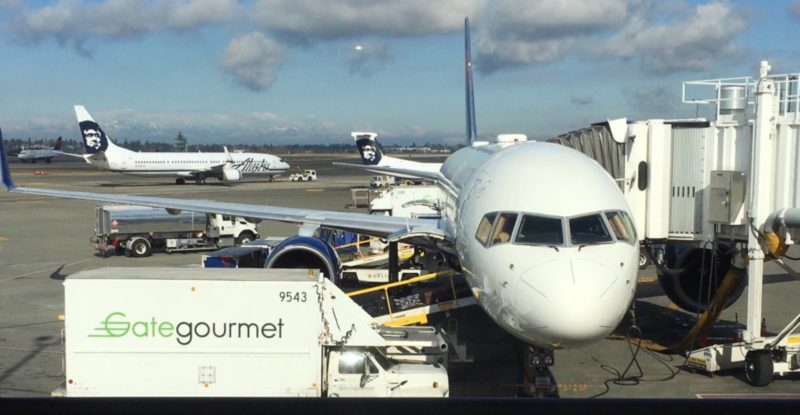As COVID-19 restrictions ease and passenger traffic increases at airports in key markets, including the US, Intelsat believes it is “well-positioned” to benefit from an expected economic expansion.
Even so, the satellite operator — which acquired Gogo Commercial Aviation in December 2020 and with it content on thousands of Ku-band inflight connectivity-fitted tails — can expect further changes at Gogo’s largest IFC customer, Delta Air Lines, as the US major has opted for a future with multiple Wi-Fi suppliers.
During the first quarter, Intelsat saw its revenue increase by 10% year-over-year to $502.8 million. Revenue for its Network Services business – which includes Gogo – was $214 million for the three-month period ended 31 March or 43% of Intelsat’s total revenue. This represented a revenue increase of 43% compared to the year-earlier quarter.
Other factors positively impacting revenue in this segment included new business from the expansion of service with certain mobility and enterprise customers, says the firm. But the increase in revenue was also partially offset by non-renewals as well as contract terminations, including by a specific enterprise customer.
Overall, direct costs and other expenses rose during the quarter, including costs attributable to the Gogo business. And Intelsat posted a net loss of $174.9 million for the period.
Company CEO Stephen Spengler in a statement referred to the results as “solid”. Pertinent to the aviation market, he noted that Intelsat’s Network Services business “benefited from new business from mobility and fixed network operators” as well as the addition of Gogo in the quarter.
While global uncertainty about the pandemic remains, Intelsat continues to closely engage with its customers as they anticipate their service needs in advance of a potential economic recovery, said Spengler. He noted that the firm is investing in a next generation software-defined network and vertical integration to leverage the opportunity to deliver end-to-end managed services to a larger addressable market.
That investment could prove particularly important in the coming years as Gogo’s largest customer, Delta Air Lines, has opted for a multi-source approach to inflight connectivity that sees rival satellite operator and aero ISP Viasat assuming a greater role in the airline’s passenger experience.
Delta in January 2021 selected Viasat’s high-capacity Ka-band satellite-supported inflight connectivity system for more than 300 mainline narrowbody aircraft, in a deal covering both new delivery and existing aircraft, including Airbus A321ceos, Boeing 737-900ERs and select Boeing 757-200s.
Now that the first Viasat-enabled aircraft has entered service, Delta is vowing to equip nearly all its domestic mainline fleet with “enhanced” inflight connectivity by the end of 2022.
Asked by Runway Girl Network if Delta has made an equipage decision for the remainder of the narrowbody fleet not covered in the initial Viasat order, and if Viasat is the chosen vendor, a Delta spokesperson said:
Our goal is to complete Viasat installation on the entire 737-900 and A321ceo fleets along with a significant number of 757-200 aircraft between May and December, with more than 300 aircraft slated to have new equipment onboard by the end of 2021.
Additional fleets, including our A321neo and A220-300, are scheduled to begin installation in early 2022. We look forward to sharing more specifics this summer.
Last year, Delta and Gogo amended their five-year-old IFC pact to provide for its early expiration of Gogo 2Ku IFC on a fleet-by-fleet staggered schedule. Is Delta eyeing its IFC equipage options for widebody aircraft (the early expiration pact with Gogo covers 2Ku installs on Delta’s A330s and A350s), RGN asked?
“We are focused on equipping the right aircraft with the right technology, and are currently evaluating our options for bringing high-speed connectivity to additional fleets including our widebody aircraft. We hope to have more to share on our plans for these fleets soon,” replied the Delta spokesperson.
The carrier assured, however, that “Gogo remains a long-term partner and one of several we are working with on the future of in-flight connectivity at Delta. To meet our long-term goals, we will work closely with multiple Wi-Fi suppliers including both Gogo and Viasat.”
Intelsat, meanwhile, anticipates emerging from its Chapter 11 financial restructuring “as a stronger and more agile company ready to deliver innovative solutions to our customers”, said Spengler.
Related Articles:
- Delta vows to equip domestic fleet with enhanced IFC by end of 2022
- Intelsat mobility customers renewed contracts in 2020
- Software-defined network part of Intelsat plan for aero
- Delta picks Viasat for more than 300 narrowbodies
- Delta to diversify IFC provider base; amends pact with Gogo
- Gogo fights to hang onto as many satcom-fitted Delta aircraft as possible
- Gogo completes sale of commercial division to Intelsat
Featured image credited to Jason Rabinowitz












